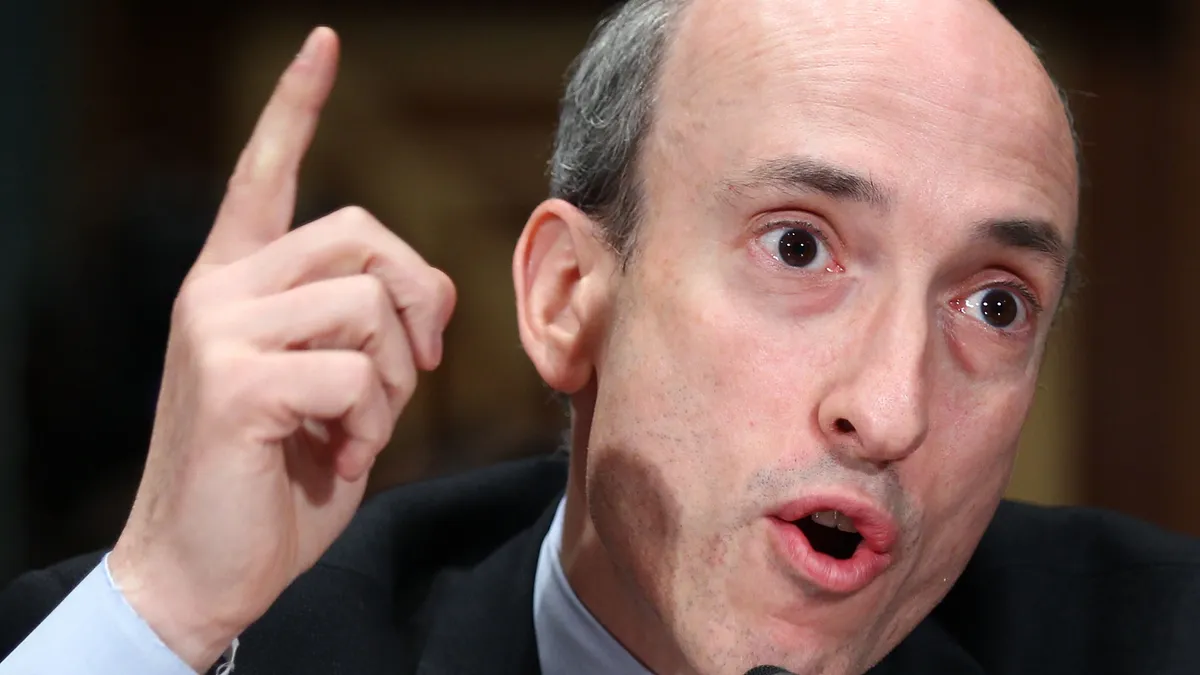Dive Brief:
- Securities and Exchange Commission Chair Gary Gensler warned Wednesday that data concentrated in just a few artificial intelligence platforms may in the next decade create widespread reliance on a narrow view of markets and lead to a financial crisis.
- “Even the biggest financial firms will be relying on some aggregated data pool or some foundation model somewhere,” Gensler said at Securities Enforcement Forum in Washington. The dependence on a single AI platform for mortgage or other data will prompt destabilizing “herding and network interconnectedness.”
- Regulators, which tend to focus on types of financial institutions rather than their “co-dependencies,” may overlook risks posed by a finite number of platforms providing AI-generated data, he said. When identifying the cause of a financial crisis potentially within the next decade, regulators may conclude “everybody was relying on the same model.”
Dive Insight:
The White House and several U.S. regulators are debating how to allow an economy-wide burst of AI innovation while limiting the risk of bias, misinformation, over-concentration of AI-generated data and “deepfake” fabrication of audio and images.
The Biden administration is preparing an executive order aiming to “ensure the federal government is doing everything in its power to advance safe and rights-respecting AI,” the White House said this month after a meeting of healthcare executives, patient advocates and academics on how the technology may advance well-being.
Several U.S. agencies seek to harness AI tools. The Department of Homeland Security wants to deploy the technology to identify cybersecurity threats, manage cybersecurity alerts and analyze cyberattacks.
The Energy Department plans to use AI tools for dozens of purposes, including automation of data collection and streamlining the flow of vehicle traffic to cut carbon emissions.
Like many top regulators, Gensler recognizes the value of AI. “Predictive data analytics and AI are already changing the face of finance,” he said Wednesday.
“It’s going to lead to greater efficiency,” Gensler said, predicting “it will transform our economy as big as, you know, the automobile revolution in the 1920s.”
At the same time, AI will “lead to concentrated nodes in the financial system,” he said. No more than four AI platforms will probably emerge in finance, with a networking clout exceeding the market heft of the three largest cloud computing companies operating today.
For example, “if you have one really solid, big data pool of the right mortgage data, everybody is going to have to go to that data aggregator,” he said. “I think that’s nearly unavoidable — that you’ll have that concentration” and “herding” of financial institutions to the lone source of AI data that steadily grows stronger and unassailable.
Gensler has also warned that companies using AI to mine insights from mountains of data will likely customize pricing and marketing with sharper precision and gain leverage over consumers.
“When communications, product offerings and pricing can be narrowly targeted efficiently to each of us, producers are more able to find each individual’s maximum willingness to pay a price or purchase a product,” Gensler said in a July speech. “With such narrowcasting, there is a greater chance to shift consumer welfare from us to producers.”
Although posing perils such as bias and fraud, “AI opens tremendous opportunities for humanity, from healthcare to science to finance,” Gensler said, calling AI “the most transformative technology of our time.”














